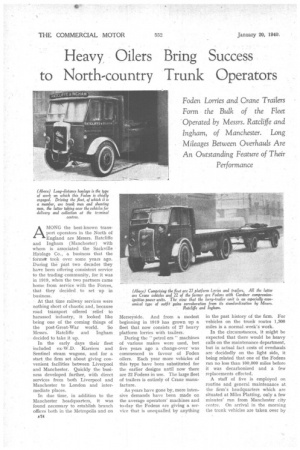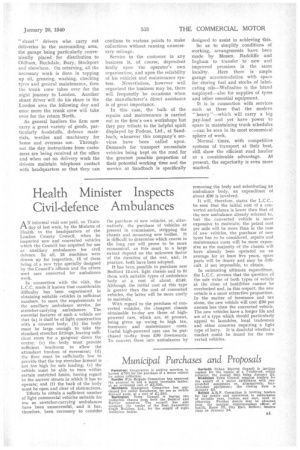Britain and America Face Sin Far Road Transport Problems
Page 26

Page 27

If you've noticed an error in this article please click here to report it so we can fix it.
Hauliers in the U.S.A. Find Many Difficulties With Individual State Laws But Authorities are Less Obsessed With Idea of Restriction and Regulation
By
Major H. E. CRAWFURD
President, Associated Road Operators A. s I think I have said before in this series of
articles, it must inevitably occur to the observer who is familiar with conditions in the roadtransport industry here and studies them over in America that the problems in the two countries are almost identical. Over and over again, when discussing affairs with men engaged in the industry in the States, I found myself listening to statements and arguments that might well have come from a haulier in this country.
There, as here, the mechanical road vehicle has revo• lutionized the whole conception of transport as to convenience, speed and punctuality. There, as here, the railways are finding themselves unable to face the new competition, partly from lack of adaptability and partly because, in certain respects, rail transport is inherently inferior to road. In the States there is a multiplicity of railroads. Trains belonging to 18 different companies run into East St. Louis from the States east of the Mississippi river. At Richmond, Virginia, I noted rolling stock belonging to eight separate systems standing in the sidings.
• Similar Tale of Railway Woes •
There, as here, there have been attempts, and they are still being made, to harass and restrict the operations of road transport in the interests of its competitors. The same catchwords—" co-ordination," " uneconomic and wasteful competition "—are employed to confuse the public mind and pervert the use of the machinery of Government to selfish ends. The same kind of propaganda is employed against the road industry and even at the same time. When I entered the Pennsylvania Railway Station, New York, on November 21, to take the train for Washington, I was confronted with enormous advertisements. They were headed :—" Clear the Lines," and consisted of the tale of railway woes with which we are .familiar in this country. When I reached London on December 8 I was greeted with the same sight, the same headlines, and about the same wording in what followed.
Transport Topics—the journal of the American Trucking Associations for December 12—contains the report of a speech by a railway lawyer advocating that road transport should pay the whole cost of the high. ways and reiterating our old friend, the allegation that
B16
read transport is "heavily subsidized" (two other statements quoted to the same effect by railroad spokesmen) ; a plea for the education of the public and the legislature by the haulage industry ; court decisions cancelling hauliers' licences for a variety of reasons, and so on. Just like an issue of The Commercial Motor.
The American "trucker," like the British road haulier, is at the moment chiefly concerned to defend his livelihood. The public on the other side, as on this side of the Atlantic, is not acutely aware of the services rendered to it by road transport, because it has come to accept them as a normal part of everyday life. We do not realize the benefit we derive from the atmosphere until we are deprived of it and begin to choke. So the American Trucking Association, like the A.R.O., is occupied with the education of public opinion. Its activities are divided between internal organization and the defence of the industry.
In one respect the haulage industry in Britain is more fortunate than its American counterpart. The latter is faced with many difficulties owing to the variation in regulations in different States. There are 48 States in the Union and each of them has its own series of regulations (some by statute and some by official ruling) as to the permissible sizes and weights of vehicles, braking, registration fees and special taxes, etc.
What is allowed in States A and C may be forbidden in State B situated between them. It may be necessary at a State border to transfer loads to another vehicle, or to detach a trailer owing to a certain type of vehicle being prohibited. The tax on petrol varies from State to State, and so, therefore, does the price. Therefore at some points you cross the border when you want to fill up and the neighbouring State obtains both the business and the revenue.
• Modification of State Transport Control • The theory that underlies the Constitution of the United States is based on the sovereignty of the individual State, That independence is waived in certain matters—i.e., foreign affairs, defence and certain criminal cases, where clearly the Federal Authority is the only one that can operate effectively. So in the case of inter-state commerce—including transportation—the complete freedom of each State to control road and other transport is modified by the authority invested in the Interstate Commerce Commission. This body was set up in 1887, and its regulatory powers over inter-state hauliers were codified in the Motor Carrier Act of 1935.
The purpose of this Act is set out in the preamble as
providing for the regulation of the transportation of passengers and property by motor carriers operating in inter-state or foreign commerce, and for other purposes." Under the Act the Interstate Commerce Commission licenses hauliers in much the same way as the Traffic Commissioners in this country, and with the same general objects. Pre-Act bona-fide hauliers were automatically granted licences under what the Americans call a " grandfather " clause. Certain conditions attach to the grant of a licence by the I.C.C. and its retention. These relate to personal conduct by the haulier, economic and-efficient transport, safety, national defence, etc.
• Congress Co-operates with Haulage Associations • It may be noted that in the first operative section of this Act it is declared to be the policy of Congress, act• ing, of course, through the I.C.C., amongst other things, "to co-operate . . . with any organization of motor carriers in the administration and enforcement of the Act."
The I.C.C. had for many years been dealing with inter-state railway and waterway transport, and as the occasion required, with road haulage. The Act of 1.935 was its charter for the regulation of inter-state road transport. It will be readily seen that the operations of the I.C.C. would naturally make for uniformity of operation, as opposed to the variety of State regulations.
As the respective functions of the individual States and the I.C.C. are hardly separable by exactly defined limits, there is the possibility of overlapping, confusion and conflict. This in fact does arise. A recent decision by the U.S.A. Supreme Court has tended to confirm the authority of an individual State, in this case Texas, against an attempt by an operator, backed by the I.C.C. to invoke the Federal Act of 1935 as against State law.
This legal and regulative duality does make many practical difficulties for the road operator. In addition,! was informed that the agencies seeking to use legislative means for the restriction of road transport are far more influential in some States than in others, and this is reflected in the resulting laws and regulations.
In this respect, then, our American friends are at a disadvantage compared with ourselves, but they have their compensations. The administration of the Motor Carriers Act of 1936 is carried on on common-sense lines and in many respects the Interstate Commerce Commission, the duty of which it is to issue regulations under this Act, adopts methods that might well be emulated by the authorities here. I have already referred to the spirit of co-operation that is shown. At every stage there is consultation between the I.C.C. and the American Trucking Association. The officials of the former are accessible at all times and are anxious to avail themselves of the experience of those engaged in the practical work of the industry.
There is another very desirable practice they follow. When new regulations are to be issued, or an appeal is made against existing regulations, an open inquiry is held in various centres and parties affected are entitled to give evidence.
Thus, when I was in Chicago, an inquiry was being held under the chairmanship of an examiner of the I.C.C. into the question of driving hours. The rigid and inelastic insistence on a fixed maximum of hours, which is a source of occasional and unnecessary annoyance here, is in the States, where mountainous and sometimes dangerous routes have to be traversed in thinly populated areas, at times a source of grave inconvenience and even danger. I listened with interest to evidence given by hauliers, drivers, union officials, safety experts, etc., all of whom were subject to. crossexamination from every other point of view,
Again, in Washington, I was present at a similar inquiry into the carriage of explosives. These inquiries are held in every case, and it is only after the presentation of the examiner's report that the regulations are framed. Their method is to inquire into the facts first and legislate afterwards. It would seem to be clear that if some such procedure had been followed before the 1933 Road, and Rail Traffic Act was framed we should have been spared some of its .grosser injustices.
• American Haulier Regarded as Good Citizen • The American trucker, too, is not regarded as a criminal following an anti-social occupation, so once he has received his licence he is as secure in his business as any other citizen. It is not subject to periodical renewal and so his goodwill is safe and marketable. He is also free to adjust his fleet to expansion in business, that is, to supply his services where there is a demand for them. It was difficult to convince some of my friends over there that permission had to be obtained for each additional vehicle in England. When I told them that a modern vehicle, with efficient brakes and pneumatic tyres travelling on an up-to-date road, was restricted to 20 m.p.h., their amazement was embarrassing, As I have said before, the American haulage industry has problems, and some of them difficult, in many cases similar to our own, but it has the advantage that it has to deal with authorities who are more sympathetic to modern methods of transport and who are more inclined to be constructive and less obsessed with the idea of regulation and restriction.




















































































